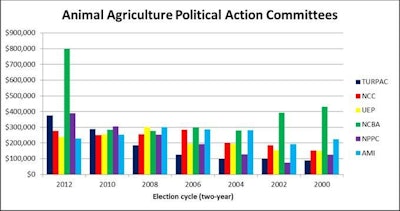
Political action committees representing the poultry industry have seen substantial growth over the past decade, at times raising more funds than the groups going to bat for the larger beef and pork industries.
Spokesmen for the National Turkey Federation, National Chicken Council and United Egg Producers have a common insight when explaining the growth: Industry members realize there are benefits to getting politically involved.
"The members are increasingly aware of how important the outcomes of elections are," said Joel Brandenberger, president of the National Turkey Federation, whose political action committee, TURPAC, grew substantially during the 2012 election cycle. "Elections cost money. Our members understand that if they individually, or collectively through TURPAC, aren't out there vigorously supporting people who understand the industry and would act accordingly in Congress, they could end up with those who might wish to do us harm."
Contributions on a continued upward trend
According to figures released by the Federal Election Commission, political action committees of the National Turkey Federation, United Egg Producers and the National Chicken Council have all been on an upward trend in terms of money raised since the 2000 federal election.
TURPAC's funds during the 2012 election cycle reached $376,373, up nearly $90,000 from the previous election cycle in 2010. The group had less than $100,000 in its coffers in 2000, making it the fastest-growing animal agriculture PAC. And Brandenberger thinks there is still room for more growth.
"The mid-term elections in 2014 will be very important. I would not be surprised to see a very strong level of contributions in 2014. I think it would be our hope that TURPAC would continue to grow, maybe not quite as rapid a rate as it grew in the previous decade, but I think we still expect it to grow," Brandenberger said.
United Egg Producers' political action committee has seen a small downtrend in contributions since the 2008 election, when it was at its highest at just a little more than $300,000 - more than any other animal agriculture PAC raised that year. But the $237,539 for the 2012 election cycle is still up dramatically from the estimated $150,000 raised in 2000.
"It may have slipped a little, but people are giving more than they did 10 or 12 years ago. That shows the level of our industry commitment continues to grow, and they see value in getting involved," said Mitch Head, United Egg Producers spokesman.
Head indicated the numbers could have been higher during the last election year, but company consolidations and the overall profitability of the industry may have held it back.
The National Chicken Council's political action committee in 2012 raised $277,032. Its funds have remained rather steady since the 2006 election cycle, when it saw a sizeable jump from just over $200,000. Its funds were comparable to those raised for United Egg Producers in 2000. Council spokesman Tom Super said the group is always looking at ways for its PAC to grow.
Measuring up to other animal PACs
While the poultry industry PACs have done well in raising money when compared to organizations representing other animal proteins, it was the National Cattlemen's Beef Organization that raised the most money for 2012, and saw the biggest increase after being stagnant for 12 years. In 2012, the beef PAC's coffers jumped up to $797,566, well more than doubling its 2010 funds, which were less than TURPAC had raised that year. The beef PAC's previous 12-year high of around $425,000 it raised in 2000.
The National Pork Producers Council raised $388,782 in 2012, a similar two-year growth pattern as TURPAC. Its funds dropped in 2002, but they have inched up every election cycle since that election year, when its funds were around $70,000. After being the second-lowest funded PAC in 2008, it has a small advantage over TURPAC to become the second-highest PAC in funds raised.
The American Meat Institute's funds in 2012 backed down to $227,032, after experiencing its 12-year high around $300,000 in 2008. Its contributions were around $210,000 in 2000.
Following the funds
TURPAC, according to Brandenberger, focuses its energy on federal House and Senate races. They have not got involved in presidential races, or state gubernatorial and legislative races. As for Congressional issues, TURPAC does not focus on any one issue, but rather a collective of those that will help the industry.
"TURPAC will never be a single-issue political action committee," Brandenberger said. "What we look for is does a candidate fundamentally understand the challenges facing the turkey industry first, the meat and poultry industry next, and then food and agriculture production in general."
An interest in legislation that affects egg product inspections has helped the United Egg Producers PAC gather support, according to Head. That bill takes a look at phasing out the conventional battery cages for colony cages as a standard for the housing of hens.
"We have a few other issues we follow, but that's our No. 1 legislative priority at the federal level," said Head.
Like TURPAC, United Egg Producers does not typically get involved in state issues and legislative races.
Tom Super, National Chicken Council spokesman, did not indicate any specific issues where their PAC focuses. Rather, they look for the greater good of the industry.
"Our members recognize the importance of being politically engaged in order to assure that the needs of the poultry industry, as well as the needs of our allied and distributor members, are heard, recognized and understood in Congress," Super said. "We will continue to support and promote pro-growth, pro-business ideology to all industries, especially the food sector."


















